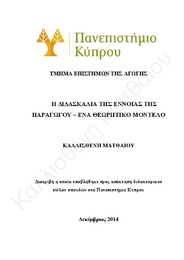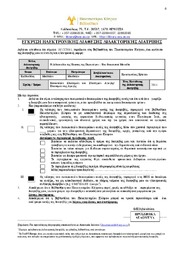| dc.contributor.advisor | Xρίστου, Kωνσταντίνος | el |
| dc.contributor.author | Ματθαίου, Καλλισθένη Μ. | el |
| dc.coverage.spatial | Κύπρος | el |
| dc.coverage.spatial | Cyprus | en |
| dc.creator | Ματθαίου, Καλλισθένη Μ. | el |
| dc.date.accessioned | 2015-01-12T09:33:49Z | |
| dc.date.accessioned | 2017-08-03T09:40:00Z | |
| dc.date.available | 2015-01-12T09:33:49Z | |
| dc.date.available | 2017-08-03T09:40:00Z | |
| dc.date.issued | 2014-12 | |
| dc.date.submitted | 2014-12-18 | |
| dc.identifier.uri | https://gnosis.library.ucy.ac.cy/handle/7/39233 | en |
| dc.description | Περιέχει βιβλιογραφία. | el |
| dc.description | Αριθμός δεδηλωμένων πηγών στη βιβλιογραφία: 205 | el |
| dc.description | Διατριβή (Διδακτορική) -- Πανεπιστήμιο Κύπρου, Σχολή Κοινωνικών Επιστημών και Επιστημών Αγωγής, Τμήμα Επιστημών της Αγωγής, 2014. | el |
| dc.description | Η βιβλιοθήκη διαθέτει αντίτυπο της διατριβής σε έντυπη μορφή. | el |
| dc.description.abstract | Η Ανάλυση αποτελεί το βασικό πυρήνα για πολλές επιστήμες και ένα από τα δυσκολότερα κεφάλαια που αναπτύσσονται στη Μέση και στην Ανώτερη εκπαίδευση. Οι μαθητές παρουσιάζουν ιδιαίτερα προβλήματα στην εννοιολογική κατανόηση των εννοιών και στην επίλυση προβλήματος κατά τη διδασκαλία της Ανάλυσης. Η παρούσα έρευνα αποσκοπούσε να συνεισφέρει στην επίλυση προβλημάτων που σχετίζονται με τις δυσκολίες των μαθητών στον τομέα αυτό. Σκοπός της ήταν αφενός η ανάπτυξη και η εμπειρική εγκυροποίηση ενός θεωρητικού μοντέλου που να λαμβάνει υπόψη τους παράγοντες που συνθέτουν τη θεωρητική γνώση των μαθητών, η οποία οδηγεί στην κατανόηση της έννοιας της παραγώγου στα πλαίσια της διδασκαλία της Ανάλυσης. Το μοντέλο βασίστηκε στη θεωρία των Sierpinska, Nnadozie και Okta (2002; Sierpinska, 2005). Αφετέρου, η έρευνα αποσκοπούσε στο σχεδιασμό και την εφαρμογή ενός παρεμβατικού προγράμματος για τη διδασκαλία, στο οποίο να λαμβάνονται υπόψη οι υπάρχουσες θεωρίες μάθησης των μαθηματικών και να εμπλέκονται και να χρησιμοποιούνται οι δυνατότητες της τεχνολογίας σε διαφορετικά πλαίσια της έννοιας της παραγώγου.
Για την υλοποίηση του σκοπού της παρούσας έρευνας αναπτύχθηκε ένα θεωρητικό μοντέλο μέσα από την ανασκόπηση της υπάρχουσας βιβλιογραφίας. Αναπτύχθηκε, επίσης, ένα παρεμβατικό πρόγραμμα στο οποίο ενσωματώθηκε η τεχνολογία για τη διδασκαλία της παραγώγου. Το υλικό που ετοιμάστηκε τέθηκε σε εφαρμογή πιλοτικά σε 88 μαθητές Β’ Λυκείου. Αξιοποιώντας τα αποτελέσματα της πιλοτικής εφαρμογής, τόσο το παρεμβατικό πρόγραμμα όσο και τα εργαλεία που αναπτύχθηκαν για τη μέτρηση της επίδοσης των μαθητών τροποποιήθηκαν αναλόγως. Στη συνέχεια εφαρμόστηκε το διαμορφωμένο παρεμβατικό πρόγραμμα (4 διδασκαλίες των 45’ λεπτών) και χορηγήθηκαν τα τελικά δοκίμια σε 214 μαθητές (97 μαθητές πειραματική ομάδα και 117 ομάδα ελέγχου) Β’ Λυκείου. Τα δοκίμια χορηγήθηκαν αμέσως μετά την εφαρμογή του παρεμβατικού και 1 μήνα μετά για εξέταση του βαθμού διατήρησης της επίδρασης του παρεμβατικού προγράμματος. Τα δεδομένα που συλλέχθηκαν αναλύθηκαν με εξειδικευμένες στατιστικές αναλύσεις (π.χ. επιβεβαιωτική παραγοντική ανάλυση, ανάλυση υπολανθανουσών ομάδων).
Τα αποτελέσματα της επιβεβαιωτικής παραγοντικής ανάλυσης τόσο αμέσως μετά το παρεμβατικό πρόγραμμα όσο και 1 μήνα μετά έδειξαν ότι το προτεινόμενο μοντέλο παρέχει ένα ολοκληρωμένο πλαίσιο περιγραφής της κατανόησης της έννοιας της παραγώγου από τους μαθητές της Β’ Λυκείου. Η επιβεβαίωση του μοντέλου δίνει τη δυνατότητα ανάλυσης της θεωρητικής γνώσης των μαθητών για την έννοια της παραγώγου σε 3 μετρήσιμους παράγοντες, τη στοχαστική, τη συστημική και την αναλυτική γνώση, με την τελευταία να επηρεάζει περισσότερο τη θεωρητική γνώση των μαθητών για την έννοια της παραγώγου. Η σταθερότητα της δομής του προτεινόμενου μοντέλου με την πάροδο του χρόνου ενισχύει την καταλληλότητα του μοντέλου και τη σημασία των παραγόντων που προτείνονται για την εξήγηση της θεωρητικής γνώσης των μαθητών.
Μέσα από τα αποτελέσματα επισημαίνεται ότι η ομάδα των μαθητών που παρακολούθησε το παρεμβατικό πρόγραμμα επιτυγχάνει μονιμοποίηση της θετικής διαφοράς της στην αρχική μέτρηση στη συστημική και την αναλυτική γνώση σε σχέση με την ομάδα που παρακολούθησε παραδοσιακή διδασκαλία, μετά και την πάροδο ενός χρονικού διαστήματος, καθώς και βελτίωση στην επίδοσή της στη στοχαστική γνώση.
Τα αποτελέσματα της έρευνας ενισχύουν τον ισχυρισμό για τα θετικά αποτελέσματα που μπορεί να επιφέρει η χρήση της τεχνολογίας στην ερμηνεία και την απεικόνιση των εννοιών παρά στην εκτέλεση χρονοβόρων διαδικασιών. Επίσης, δίνουν την ευχέρεια στους εκπαιδευτικούς να χρησιμοποιήσουν τις δυνατότητες που παρέχει η τεχνολογία για ενίσχυση της εννοιολογικής κατανόησης των μαθητών. | el |
| dc.description.abstract | Calculus is the core for many sciences and one of the most difficult chapters taught in Secondary and Higher education. Students present particular problems in the conceptual understanding of the meanings and the problem solution during the Calculus teaching. This research aims at contributing to resolving of problems related to the students’ difficulties in this area. Its goal was to develop and empirically validate a theoretical model taking into consideration the factors that form the theoretical thinking of the students, which leads to the understanding of the concept of derivatives in the framework of Calculus teaching. The model was based on the theory of Sierpinska, Nnadozie and Okta (2002; Sierpinska, 2005). Moreover, the research aims at designing and implementing an intervention teaching program, in which all the existing theories of learning mathematics were be taken into account, using, at the same time, the technological potentials in various frameworks of the concept of derivative.
For the realization of the goal of the current research, a theoretical model was developed through the existing bibliography. An intervention program was also developed, integrating the technology for the teaching of derivatives. The material was piloted in 88 students of the 2nd Grade of Lyceum. Assessing the results of the pilot implementation, both the intervention program and the tools developed for measuring the performance of the students were modified accordingly. Then, the modified intervention program was implemented (4 teaching periods of 45’ each) and the final tests were given to 214 students (97 students in the experimental group and 117 in the control group) of the 2nd Grade of Lyceum. The tests were given immediately after the implementation of the intervention program and after a month to evaluate the extent of the influence of the intervention program. The data collected were analyzed through specialized statistical analyses (e.g. Confirmatory Factor Analysis, Latent Class Analysis).
The results of the confirmatory factor analysis both immediately after the intervention program and a month following the program showed that the suggested model provides a comprehensive framework for the description of the understanding of the concept of derivative by the students at the 2nd Grade of Lyceum. The verification of the model gives the potential to analyze the theoretical thinking of the students for the concept of derivative in three quantifiable factors: reflective, systemic and analytic thinking, with the latter exercising more influence in the theoretical thinking of the students for the concept of derivative. The stability of the structure of the suggested model over time enhances its suitability and the importance of the factors recommended for the explanation of the theoretical thinking of students.
The results underline that the group of students taught the intervention program accelerates the establishment of its positive difference in the initial measuring in the systemic and analytical thinking, compared to the group taught in the traditional way, after the course of a period of time, and improves the performance in the reflective thinking.
The results of the research reinforce the claim for the positive results of the use of technology in interpreting and representing the concepts, despite the time-consuming procedures. Also, they provide the educators the option to use the potentials of the technology for the reinforcement of the conceptual understanding of students. | en |
| dc.format.extent | xvii, 210 σ. : εικ. ; 30 εκ. | el |
| dc.language.iso | gre | en |
| dc.publisher | Πανεπιστήμιο Κύπρου, Σχολή Κοινωνικών Επιστημών και Επιστημών Αγωγής / University of Cyprus, Faculty of Social Sciences and Education | |
| dc.rights | info:eu-repo/semantics/openAccess | en |
| dc.rights | Open Access | en |
| dc.subject.lcsh | Mathematics Study and teaching | en |
| dc.subject.lcsh | Mathematics Study and teaching (Secondary) Cyprus | en |
| dc.subject.lcsh | Calculus | en |
| dc.subject.lcsh | Learning | en |
| dc.title | Η διδασκαλία της έννοιας της παραγώγου - ένα θεωρητικό μοντέλο | el |
| dc.title.alternative | Teaching the Concept of Derivative – A Theoretical Model | en |
| dc.type | info:eu-repo/semantics/doctoralThesis | en |
| dc.contributor.committeemember | Xρίστου, Kωνσταντίνος | el |
| dc.contributor.committeemember | Πίττα-Πανταζή, Δήμητρα | el |
| dc.contributor.committeemember | Γαγάτσης, Αθανάσιος | el |
| dc.contributor.committeemember | Ζαχαριάδης, Θεοδόσιος | el |
| dc.contributor.committeemember | Πόταρη, Δέσποινα | el |
| dc.contributor.committeemember | Christou, Constantinos | en |
| dc.contributor.committeemember | Pitta-Pantazi, Demetra | en |
| dc.contributor.committeemember | Gagatsis, Athanasios | en |
| dc.contributor.committeemember | Zachariades, Theodosios | en |
| dc.contributor.committeemember | Potari, Despoina | en |
| dc.contributor.department | Πανεπιστήμιο Κύπρου, Σχολή Κοινωνικών Επιστημών και Επιστημών Αγωγής, Τμήμα Επιστημών της Αγωγής | el |
| dc.contributor.department | University of Cyprus, Faculty of Social Sciences and Education, Department of Education | en |
| dc.subject.uncontrolledterm | ΔΙΔΑΣΚΑΛΙΑ ΤΗΣ ΑΝΑΛΥΣΗΣ | el |
| dc.subject.uncontrolledterm | ΠΑΡΑΓΩΓΟΣ | el |
| dc.subject.uncontrolledterm | ΘΕΩΡΗΤΙΚΗ ΓΝΩΣΗ | el |
| dc.subject.uncontrolledterm | ΣΤΟΧΑΣΤΙΚΗ, ΣΥΣΤΗΜΙΚΗ, ΑΝΑΛΥΤΙΚΗ ΓΝΩΣΗ | el |
| dc.subject.uncontrolledterm | ΗΛΕΚΤΡΟΝΙΚΑ ΣΥΣΤΗΜΑΤΑ ΆΛΓΕΒΡΑΣ | el |
| dc.subject.uncontrolledterm | TEACHING CALCULUS | en |
| dc.subject.uncontrolledterm | DERIVATIVE | en |
| dc.subject.uncontrolledterm | THEORETICAL THINKING | en |
| dc.subject.uncontrolledterm | REFLECTIVE, SYSTEMIC, ANALYTIC THINKING | en |
| dc.subject.uncontrolledterm | COMPUTER ALGEBRA SYSTEM - CAS | en |
| dc.identifier.lc | QA11.2.M387 2014 | en |
| dc.author.faculty | Σχολή Κοινωνικών Επιστημών και Επιστημών Αγωγής / Faculty of Social Sciences and Education | |
| dc.author.department | Τμήμα Επιστημών της Αγωγής / Department of Education | |
| dc.type.uhtype | Doctoral Thesis | en |
| dc.rights.embargodate | 2014-12-18 | |
| dc.contributor.orcid | Χρίστου, Κωνσταντίνος [0000-0002-5901-5931] | |


